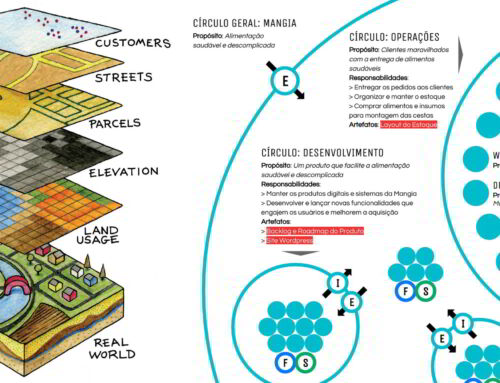Working with self-management, giving courses and consulting, I usually find people saying they want to create their own management model, their governance framework or their way of organizing work without using the chain of command and, in that sense, they share with me a noble and challenging goal. However, most of these people have never worked in a self-managed organization and, I feel they were very traumatized working in hierarchical organizations. It seems to me that for them, self-management has not become popular because there are no social practices or technologies that work and that please them to the point of spreading around the world and becoming mainstream. So, it was up to them to create something unique, and who knows, revolutionary.
For these people, I have three messages that may sound harsh or surly.
- Note that capitalism is not a fertile environment for self-management.
- Learn a language before becoming a linguist.
- The difficulty is not in the use, but in the learning
Capitalism is not a fertile environment for self-management
Two years after the creation of Holacracia, the article that gave rise to Bitcoin was published and, with that, a period of growth of technologies, companies and initiatives related to the blockchain and derivatives began. New ways of doing marketing such as Inbound Marketing also exploded and became popular in a short time. Even the agile movement that had its historic landmark in 2001, in less than 20 years has become an overwhelming force in the area of software development.
With self-management we will not have this growth and popularization. Self-management clashes with structures in organizations that reflect a hierarchical, patriarchal worldview that overvalues capitalism and its imaginary beings: meritocracy, free market and the entrepreneurial hero leader.
It goes far beyond removing obstacles for teams to produce software for the owners of capital. It does not propose mechanisms to facilitate the sale of digital products, nor for the unregulated and free circulation of capital. Self-management distributes authority and gives people a voice to address their tensions, including those over how wages are set.
I’m sure there is still a lot of room for self-management practices to evolve. But its low dissemination is not a sign that current practices “do not work”. It is just a sign that self-management will not be the darling of our capitalist society. There is progress and interest, but if we look at the adoption curve, we are moving slowly and with no expectation of becoming widespread.
Learn a language before becoming a linguist
I shouldn’t even have to say this, but reading a book doesn’t make you knowledgeable about self-management. Reading two or five isn’t either. It’s something that needs to be experienced in a social system, at least in an organization. I know, opportunities are still rare, but you can’t pretend otherwise.
And creating something new presupposes that you know the old, even to be able to distinguish the new. It’s great when we can learn from each other’s experience and it needs to be done. Sociocracy, Holacracy, O2, etc, have already been created and continue to be used by organizations around the world. It’s much easier to start with one of them and evolve than to want to do it from scratch, or looking to extract useful tips and heuristics from the Reinventing Organizations book.
Furthermore, deep language learning – and in the end, O2 social technology, as I understand and promote, is very much a language for building agreements – depends on everyday use in a social context. That’s why the reports found in articles and magazines are not enough. Learn about self-management by experiencing it, before proposing the new unique, and who knows, revolutionary way.
The difficulty is not in the use, but in the learning
My daughter on her 10th birthday decided to have a sleepover with some friends at home. For dinner we ordered a pizza and everyone sat at the table to wait. My daughter, at the head of the table, begins to speak, deepening her voice and playing a company boss at her directors’ meeting. The game follows a typical scene from the corporate world we know. I felt a little despair at the time, but I wasn’t so surprised.
People come into organizations knowing very well how to behave where there are bosses and subordinates. They know the scripts, they know or quickly learn to play the game for power and influence. They have been exposed to this logic of hierarchical structures in the family, at school and in the media.
Changing habits, beliefs and cultures is not simple. In fact, it’s 100 times harder than self-management itself. We face a huge challenge of (un)learning and learning a new language. We don’t have a magic formula or a simple golden rule capable of making or creating a self-managed organization. It’s hard work and it’s not glamorous.
The search for easily replicable models ignores this context. Many feel that the current known approaches are too complicated, when in fact they would be simple alternatives if they were taught and experienced from a very early age as part of our culture, but unfortunately they are not.
Closing
So if you are interested in creating organizations that do not use the chain of command, we are on that path and would love to connect with you. But if you deliberately choose to ignore these messages, please let me know, as I might reconsider participating in this exchange. ;)
Note: We created O2 after a period of practical experience with Holacracy. And we invite you to do the same. Try O2, then modify or customize a set of meta-agreements for your organization. We are here to help.
Translated by Tanya Stergiou






Leave A Comment